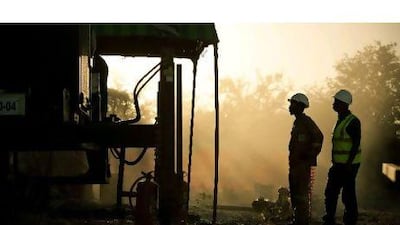The Australian company does not have much to show in the way of profit, but it does own the rights to huge deposits of high-quality hard coking coal in Mozambique
If an equities analyst were to bet on which Australian companies held the greatest growth prospects for next year, he would be hard-pressed not to choose the small and medium-size copper, oil and coal mining companies that have soared on the local bourse in the past year.
The proof is in the interest global mining and steel companies are showing in a virtually unknown resources company that happens to control some of the best coal assets on the planet. Riversdale Mining, a tiny coal miner with no extraordinary profits, is considered one of the best resource plays around.
The mining world's attention was first caught by a bid from global miner Rio Tinto, which made a US$3.5 billion (Dh12.85bn) approach for Riversdale this month. This week, Rio upped the bid to $3.75bn, prompted by Riversdale's soaring share price. The company is now in a trading halt, ahead of an announcement of the takeover.
Riversdale controls 13 billion tons of coal reserves in Mozambique, much of which is export-quality, industrial coking coal. Its mines could eventually supply as much as 10 per cent of the global market for the key steel-making material.
As coking-coal prices continue to soar, it is not just Rio that is showing an interest. Brazil's Vale has been touted as the most likely rival to Rio if its bid is not accepted, as it already has coal mines in Mozambique. India's Tata Steel, Riversdale's biggest shareholder, is another contender.
There is also mounting speculation that India's International Coal Ventures will also launch a bid for Riversdale. Some of the more familiar mining names are also said to be in the mix, notably Peabody Energy, Xstrata, Anglo American and ENRC.
Riversdale is hardly the jewel in Australia's coal-mining crown. In the year to June 30, it posted a $779,000 loss, down from a $300,000 profit accrued the year previously, based on steadily reducing production levels at its Zululand anthracite colliery in South Africa.
As with so many ventures in mining, it is not the actual but the potential numbers that count. Riversdale has what the industry terms "tier one" assets - "high quality, low-cost, export-oriented and expandable" as one analyst describes them. The company's main Benga project in Mozambique is targeting 20 million tonnes of coal output per annum by 2013.
Now offering $16 a share, Rio is likely to need to bid more to win support from Riversdale's three major shareholders: Tata Steel, the Brazilian steel maker CSN and the US investment firm Passport Capital, which together own more than half the company. The shares climbed even further in the past week to as high as $16.50, pricing the company at nearly $200 million above the Rio bid. Only a month ago, the company's shares were trading at about $10.50.
The advantages to a big miner are considerable. If Riversdale's projects were to produce as much as 15 million tonnes of saleable coal per year, it would boost Rio's overall coal volumes by 50 per cent and double its hard coking coal assets. Coking coal is Rio's Achilles' heel, the one commodity its resources armoury currently lacks.
The Indians also see a chance at controlling a commodity that goes to the heart of the country's burgeoning economic needs. India lacks its own sources of coking coal, although it is relatively self-sufficient in iron ore, the other key ingredient in steel-making.
The other proposition is Riversdale's third project in Mozambique, Tete East, where it hopes to sell a 50 per cent stake and management rights. Like the Benga project, it contains huge volumes of high-quality coking coal, but Riversdale lacks the infrastructure to exploit it. It risks Mozambique invoking a "use it or lose it" policy on the third project.
The analyst Charlie Aitken at Southern Cross Equities says the markets in Australia have never doubted Riversdale's "A" grade resources. "They simply doubted how they would commercialise it by finding a feasible infrastructure solution," Mr Aitken says.
Infrastructure solutions is what the big global miners deal in. As coking-coal prices are expected to rise next year, it will be interesting to see just how much "infrastructure" - and cash - they will be prepared to throw at it.

